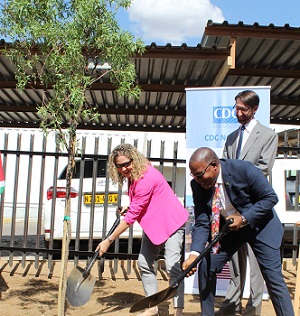
CDC Namibia celebrates 20th anniversary with symbolic tree planting

The U.S. Centers for Disease Control (CDC) and Prevention celebrated its 20th anniversary in the country with a symbolic planting of a tree at an event held in Windhoek this week.
CDC is the United States public health agency. CDC works in the United States, and across the world to prevent, detect, and respond to disease threats.
U.S. Embassy Chargé d’Affaires, Jessica Long planted a tree alongside Executive Director, Ben Nangombe.
“Planting a tree is a symbol of what we do in government, in public health, and in our lives – we are called to live lives of service, to grow deep roots that will help us weather together hard seasons of drought, or COVID-19, or HIV. CDC Namibia works hand in hand with the Namibian Government to strengthen the provision of healthcare in Namibia. This work, with its deep roots, is overflowing with achievements, successes, and hope,” cited Long.
She reflected on the achievements made by MoHSS, with support from CDC Namibia, in the last twenty years and confirmed the ongoing partnership between the American and Namibian governments.
“We are proud to be partners in health with the Ministry of Health and Social Services over the last 20 years and we are committed to continuing this partnership,” she added.
Speaking at the same event, Dr. Brian Baker, CDC Namibia Country Director said, “Together we have achieved so much. We have prevented new HIV and TB infections, and we have saved lives. Together we confront global disease threats and tackle the world’s biggest health problems.”
CDC collaborates with the Ministry of Health and Social Services to build the capacity of Namibia’s healthcare workforce and systems to prevent, detect, and respond to public health threats. A primary focus of the CDC and MoHSS partnership is to control the HIV and TB epidemics through targeted strategies to prevent new infections and reduce deaths.
CDC supports MoHSS to achieve these goals through a multi-pronged approach including strengthening clinical and laboratory systems through the MOHSS Quality Management framework; supporting human resources for health systems to build and maintain an effective health workforce and fill critical workforce gaps, and optimizing health information systems to ensure that data is available to inform clinical care and policy making.
The U.S. Centers for Disease Control and Prevention opened its first office in Windhoek in 2002, with subsequent satellite offices in Oshakati, Rundu, and Katima Mulilo.
 U.S. Embassy Chargé d’Affaires Ms. Jessica Long and Ministry of Health and Social Services Executive Director Mr. Benetus Nangombe planting the tree, with U.S. Centers for Disease Control and Prevention (CDC) Namibia Country Director Dr. Brian Baker in the background.
U.S. Embassy Chargé d’Affaires Ms. Jessica Long and Ministry of Health and Social Services Executive Director Mr. Benetus Nangombe planting the tree, with U.S. Centers for Disease Control and Prevention (CDC) Namibia Country Director Dr. Brian Baker in the background.















































